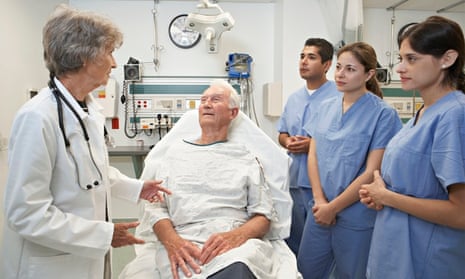I have often been asked by friends and relatives what the hardest part of medical school was. People think that I will answer, “All the books I had to read, all the things I had to know and all the exams I had to revise for.” No one expects me to say: “Surviving.” The truth is being a medical student these days brings a new variety of pressures, not least financial, and for many this is set to rise.
On Wednesday, I will join thousands of other junior doctors starting their jobs on the wards and surviving will take on a new meaning. It will involve the scrutiny of the whole ward as you search desperately for Mr Green’s lost notes while trying to recall the exact date of Mrs King’s left toe amputation, as the consultant quizzes you on everything from the precise time she last opened her bowels to the specifics on the volume of sputum she last coughed up: “Was it a teaspoon or a tablespoon?” It will involve the wrath of the ward sister when you still haven’t written up Mrs Hill’s fluids two hours after you were asked to because you’ve spent that time trying to get a cannula in Mr Thompson, who then went into cardiac arrest in the middle of it all. It will involve remembering to drink something to avoid developing acute kidney injury yourself 12 hours into your shift, and, for me, it will also involve surviving for four weeks till the first payday, with £45,000 of student debt to my name.
My few weeks of freedom between finishing medical school and starting life as a junior doctor have been spent, much to my embarrassment, signing on at the local job centre. Fresh out of medical school, with no job, no student loan and no parental financial support, the disapproving looks and raised eyebrows of job centre staff sum up my humiliation. I want to tell them how hard I’ve worked, how I’ve spent the last year preparing for finals and work, shadowing and helping the junior doctors on the wards, working nights and weekends caring for the sick, frail and dying always unpaid. Instead, I feel like a naughty child as I try and explain why I couldn’t attend the last appointment and beg them not to sanction me. Ironically, the reason I couldn’t attend was because I was speaking at the British Medical Association’s annual representative meeting on the financial barriers faced by future doctors from less privileged backgrounds.
Eighty per cent of medical students come from the same 20% of schools. From an underprivileged state-educated background, I fitted into a category still under-represented in medicine, a category from which much research goes into trying to recruit. What is behind this under-representation? It might be because these students’ parents aren’t doctors who can offer them work experience for their Ucas applications. It might be that they can’t afford to pay for summer schools, interview training and UKCAT (UK clinical aptitude test) courses. It might be that their sixth form tutors are more at home with writing references for travel and tourism courses than they are medicine, and it might be that they couldn’t afford a summer in Tanzania building orphanages to demonstrate their skills in caring. My own application to medical school took two attempts and I hazard a guess these were some of the reasons behind the initial rejections.
Had I not been blissfully unaware of the extent of the financial difficulty that would cumulate throughout medical school this may have been the greatest barrier of all to a career in medicine. Fortunately, I was not aware that in my second year my parents would divorce, the family house would be repossessed and I would have no home or cooked meals to return to in the holidays. I was oblivious to the fact that in addition to the tuition and maintenance loans and grant which I was eligible for, I would incur multiple other loans needed to support myself. I was safe from the knowledge that while waiting for these loans to be approved I would be reliant upon the charity of food banks. I was unaware that I would begin work as a junior doctor on a salary that, has in real terms, been chipped away for the past five years. And, that it would be further diminished with increments of the £45,000 debt I would amass to be paid back with interest rates of up to 3%.
More disturbing is the knowledge that had I started medical school one year later when tuition fees rose to £9,000, this debt would have been in the region of £80,000. Alarmingly, for those who have not yet embarked upon their medical degrees, George Osborne announced in his budget that the cap on tuition fees will be removed and student grants – a lifeline to those from less privileged backgrounds – will be cut and replaced with loans leaving newly qualified doctors with debts exceeding £100,000.
As I begin this new chapter, I realise there is something the NHS and I have in common; the energy out is far exceeding the fuel going in and we are both surviving – just. Increasingly the battle to survive is beginning at the very start of medical training. If we value the diversity of our future medical workforce, we must not starve it at its roots.
If you would like to write a blogpost for Views from the NHS frontline, read our guidelines and get in touch by emailing healthcare@theguardian.com.
Join our network to read more pieces like this. And follow us on Twitter (@GdnHealthcare) to keep up with the latest healthcare news and views.





Comments (…)
Sign in or create your Guardian account to join the discussion